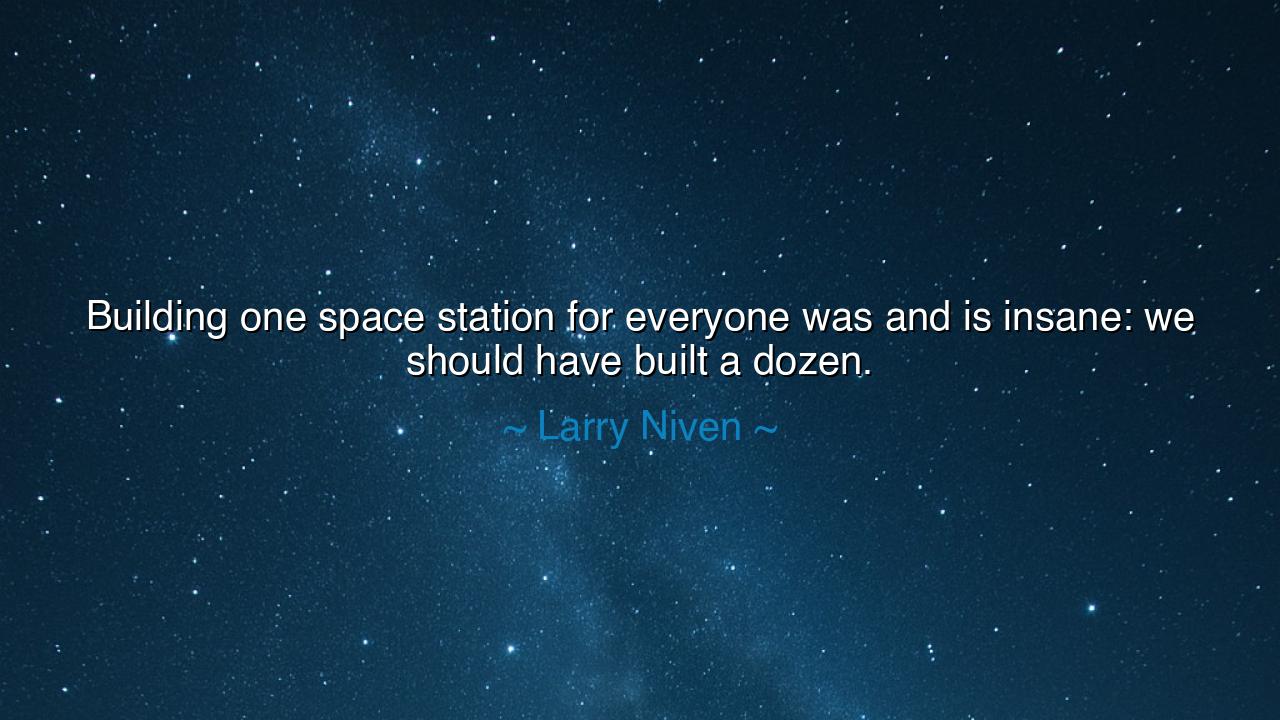
Building one space station for everyone was and is insane: we
Building one space station for everyone was and is insane: we should have built a dozen.






"Building one space station for everyone was and is insane: we should have built a dozen." — these words by Larry Niven carry a powerful message about ambition, vision, and the nature of progress. Niven, known for his work in science fiction, challenges the traditional thinking of space exploration, offering a vision that is bold and expansive. To suggest that humanity’s efforts in space should not be focused on a single space station—a solitary, isolated achievement—but on the creation of a network, a web of interconnected stations, speaks to a larger philosophy of progress. It is not enough to build one monument to human achievement; we must build many, and in doing so, we expand the possibilities of what humanity can achieve.
In the ancient world, the concept of greatness was often tied to the idea of conquest—of building empires, of establishing monumental structures, or of creating something that would endure for centuries. The Romans, for example, built roads, aqueducts, and cities that spanned vast distances, connecting their empire in ways that shaped the future of civilization. The vision was not limited to the creation of isolated structures but to a network of interconnected systems that would strengthen the entire empire. Niven’s words, in a sense, reflect the same ambition—the desire not to create one isolated achievement but to create a system, an interconnected future that extends far beyond the horizon of the present.
Just as the Romans did not build roads for the sake of one city but to unify a vast empire, so too should we view space exploration. The construction of a single space station is a monumental achievement, no doubt, but it is only a small step in the broader cosmic journey. By imagining a future with multiple space stations scattered across the heavens—each one serving as a node in a greater system—we tap into the potential of humanity to expand beyond Earth, to live in the vastness of space, and to develop a truly interconnected future. The very act of building a network of space stations would not only further the cause of humanity's space ambitions but would also accelerate progress in ways that a single station alone could never do.
Consider the example of Christopher Columbus. When Columbus set sail in 1492, his journey was not about reaching a single destination or conquering a single land; it was about connecting the old world to the new, about creating a new network of trade, exploration, and understanding. Though his journey was met with doubt and criticism, it ultimately led to a profound transformation of the world. The legacy of Columbus is not in the discovery of one place but in the opening of doors to countless new lands and ideas. Similarly, space exploration should not be viewed as a singular pursuit, but as a network of possibilities, each space station a new door leading to deeper discoveries, greater cooperation, and new frontiers.
Niven’s call for a dozen space stations is a reflection of a vision that goes beyond the status quo. It challenges the norms of how we approach the exploration of the stars. The reality of space travel is often tied to constraints: money, technology, politics, and limited vision. But Niven’s perspective urges us to think bigger, to imagine not just incremental progress but a bold leap forward. We must not be limited by the thinking of today but instead look at the vast cosmic horizon and imagine a network of space stations that could serve as the foundation for human life in space. Just as the ancients built their empires not on a single city but on an interconnected system of places, we too must build a future in space that is interconnected, vibrant, and expansive.
In our own lives, we are often tempted to focus on small goals—to build a single project, to reach one achievement, to settle for what is immediately attainable. But Niven’s words challenge us to think beyond the immediate, to envision the grand network of possibility that exists in the future. If we are to truly progress, we must dream of interconnected systems, of goals that build upon each other, of achievements that open new doors and create opportunities for others. In our personal and professional lives, this might mean seeking collaboration over isolation, long-term vision over short-term gains, and working toward greater networks of support that benefit all.
Thus, the lesson here is one of vision and ambition. We are capable of far more than we often realize, but to achieve this, we must think boldly, act collaboratively, and dream of futures that are not constrained by the limitations of today. Let us not build just one space station, one empire, one goal, but let us build a network—a system of connected dreams and goals that expand the horizons of human potential. In doing so, we will not only fulfill our own aspirations but leave a legacy that resonates throughout the universe.






AAdministratorAdministrator
Welcome, honored guests. Please leave a comment, we will respond soon